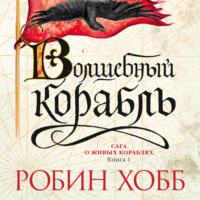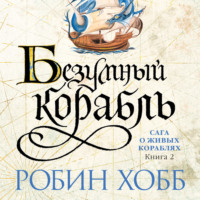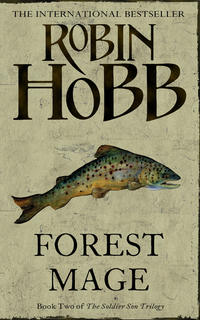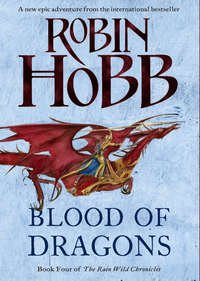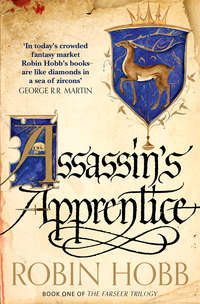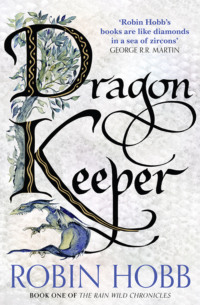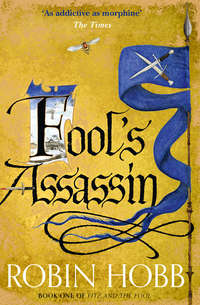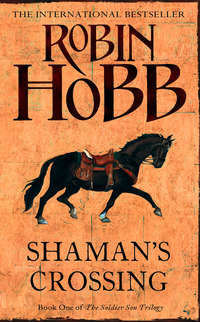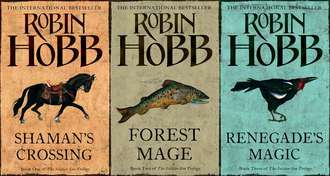
Полная версия
The Complete Soldier Son Trilogy: Shaman’s Crossing, Forest Mage, Renegade’s Magic
‘But that’s not fair! He can’t exclude us or kick us out of the Academy just because we aren’t from Old Noble stock.’ Spink was shocked and angry.
Trist stood up, tall and lean, and stretched casually. ‘You keep saying that, Spink, lad. But the fact is, fair or not, he can do it. So you’d best find ways to make it less likely it will happen to you. That’s what my father advised me before I left. Make the right friends. Show the right attitude. And don’t make trouble. Or be seen with trouble-makers. A little free advice: Going about whining “that’s not fair” isn’t going to endear you to Colonel Stiet.’ He rolled his shoulders and I heard his spine crack.
‘I’m off to bed, children,’ he informed us archly. I liked Trist, but his superior manner at that moment grated on me. ‘I have to be up early, you know.’
‘So do we all,’ Rory observed cheerlessly.
We dispersed from our hearth into the chill of the bunkrooms. I said my prayers and got into my bed but could not fall asleep. Spink seemed to share my insomnia for he whispered into the quiet, ‘What happens to us if we get sent home from Academy?’
I was surprised he didn’t know. ‘You’re a soldier son. You enlist as a common soldier and do the best you can from there.’
‘Or, if you’re lucky, some rich relative buys you a commission and you go off as an officer anyway,’ Nate added into Spink’s despairing silence.
‘I don’t have any rich relatives. At least, I don’t have any who like me.’
‘Me, neither,’ Kort observed. ‘So perhaps we’d better sleep tonight and study hard tomorrow. I don’t like the idea of marching for the rest of my life.’
We all fell asleep to that thought, but I think I lay awake longer than the rest of them. Spink’s family had no money to buy him a commission if he were culled from the Academy. My father did, perhaps. But would he? He had never intended that I should overhear his doubts of my ability to be a leader and hence an officer. But once I knew that he had them, it had made my golden future shine a little less brilliantly. In the back of my mind, I had been consoling myself that graduating from the Academy virtually guaranteed I would be at least a lieutenant, and both my father and Sergeant Duril had said that even the most idiotic lieutenant could usually make captain, by attrition if by no other means. But what if I were culled? Would my father judge me, after that failure, worth the cost of a good commission? The positions in the best regiments were very dear, and even in the less desirable ones, they were not cheap. Would he think I was worthy of that expense or would he consider it good money thrown after bad, and leave me to enlist as a common soldier? Ever since I had been old enough to realize I was a second son and meant by the good god to be a soldier, I had thought my future assured. On my eighteenth birthday, I had thought I grasped it in my hands. Now, I perceived that golden future could be lost, and not even through my fault, but purely by the politics of the day. Prior to the Academy, I had given little thought to the prejudice I might encounter as the second son of a New Noble. During my training with Sergeant Duril it had seemed a thing I could easily overcome by dint of solid effort and good intentions.
I hovered at the edge of sleep. I think I dozed. Then I felt a sudden sting of outrage. I sat up in the dark. As if from a distance, I heard myself speak. ‘A true warrior would not put up with continued humiliations. A true warrior would find a way to strike back.’
Spink shifted in his bed. ‘Nevare’s talking in his sleep again,’ he complained to the quiet room.
‘Shut up, Nevare,’ Kort and Natred said in weary chorus. I lay back in my bunk and let sleep take me.
The few weeks of initiation that remained seemed an eternity to me. The pranks grew rougher. One night, we were all rousted out of bed in our nightshirts and forced outside in a cold, driving rain and told to stand at attention. Sergeant Rufet had been lured from his desk for that one; he found us when he was doing one of his regular rounds of the building, and angrily ordered us back to bed. I could no longer, as Rory did, shake such humiliations off as a challenge to toughen me. I now saw them as a small place where the Old Nobles’ sons could unveil how they truly felt about us. When they taunted me or forced me to behave foolishly or wasted my time with unnecessary tasks, it now burned in my soul. It created a little well of anger in me, one that they fed, drop by drop. I had always been a good-natured fellow, able to take a joke, able to forgive even the roughest of practical jokes. Those six weeks taught me why some men carry grudges.
I began, foolishly perhaps, to take small vengeances. When I blacked the second-years’ boots, I took care to get blacking on the laces so they’d dirty their hands. They caught me at that, of course, and angrily warned me to be more careful the next time. I blacked the boots meticulously, but pushed a thumbful of pine-tar up into the treads of several random boots. They tracked the sticky mess all over their floors the next morning as they left their dormitory, and reaped the punishment for a sticky floor at the noon inspection. That, they blamed on each other, and had demerits of their own to march off. That pleased me. Far better to make their misfortunes seem accidental.
A few nights later, I rose from my bed after I judged the others were asleep. I walked silently through the study room, but just as I reached the door, Rory spoke.
‘Where you going, Nevare?’
He and Nate had been sitting in the dark, talking quietly. I hadn’t noticed them.
‘Out. Just for a minute.’
‘What you got there? More tree gum?’
When I made no reply, Rory gave a snort of laughter. ‘I saw you gatherin’ it the other day. Pretty smooth, Nevare. Actually, pretty sticky. And I wouldn’t a thought it of you. What are ya doing now?’
I was torn between reluctance and a certain amount of pride in my cleverness. I came back to the hearth, blew briefly on the coals to wake a feeble flame, and then showed them what I held in my hand.
‘Wood chips? What are you going to do with wood chips?’
‘Wedge them into a door frame.’
Nate was shocked. ‘Nevare! That’s not like you. Or is it?’
I shook my head, a bit surprised at his question, and taken aback for a moment. It wasn’t like me to play such tricks. More like Dewara, I thought to myself. It was a plainsman tactic, this subtle revenge, and probably unworthy of a gentleman. I tried to care about that, and could not. It was almost as if I had discovered a second me inside myself, capable of such things.
Rory leaned closer to my hand to peer at the chips, and then shook his head. ‘They’re too little to make any difference. They won’t hold.’
‘Want to bet?’ I asked him.
‘I’m coming with you. I got to see this.’
Rory and Nate followed me as I crept down the stairwell to the next floor. The second-years had a door that opened out from their study room onto the stairwell. They closed it at night to hold the heat in their rooms. I crouched down. The dim lantern in the stairwell barely illuminated my work as I carefully stacked the wood chips into a series of wedges under their door. ‘Do some in the sides, too,’ Rory suggested in a whisper.
I nodded, grinning, and worked them in just above the hinges, pressing them firmly into the crack and pushing them flush to the frame.
The next morning we hastened our fellows out of the room and down to the parade ground, ignoring the pounding and shouting from the second-years’ door as we passed it. There, we assembled without Corporal Dent, and were innocently awaiting our corporal when the third-years and the cadet officers arrived. All the second-years were late to the parade ground and awarded demerits as a result. It was easy for most of us to look innocent, for Nate, Rory and I had kept our secret to ourselves. I don’t know if Nate or Rory whispered, but by noon, all my fellows had, in one way or another, conveyed subtle congratulations to me. Our corporal suspected us and did his best to make us miserable that day. Yet his best efforts did little to dampen our spirits, and that, I think, infuriated him all the more.
I should not have been the instigator of such a trick, for I should have known that Rory would only escalate the war of mischief. I think it was he who pissed in their water ewer and left it by their washbasin, but I have no way to be certain. Day after day, the second-years bullied us, and every day, we found some small way to strike back. We were far more adept than they were at subterfuge, and more creative. Flour and sugar rubbed into their bed sheets meant they awoke as sticky as dumplings. A hollowed stick of firewood, packed with horsehair from the stables, drove them out of their study room one night. They cursed at us and accused us, but could prove nothing. We marched off the demerits, kept our eyes down and seemed to submit to them, but at night, after lights-out, we often gathered to whisper and rejoice in our defiance. All good-natured tolerance for our ‘initiation’ was gone. We waged a war of endurance, now, to prove we would not be run off.
The six-week initiation culminated in a grand mêlée on the parade ground. Traditionally, it was some sort of mock battle, a wrestling competition or a tug-of-war or footraces or other sport challenge between the houses that theoretically dispersed any ill-feeling that had built up during the initiation. All were to emerge from it peers and equals, Academy cadets one and all. But in my first-year, it all went wrong, and to this day, I do not think what happened was entirely an accident. How naive we all were! We had been brought to the edge of a boil and held there by bullying and pressure. We should have known better to put any trust in anything a second-year from our house told us. Yet when Corporal Dent came pounding up the stairs, shouting at us to rally, for Bringham House had stolen the flag of Carneston House and was defying us to take it back, we all slammed our books shut and left our Sevday afternoon study to pelt down the staircase out onto the parade ground.
Across the parade ground, to our fury, we beheld our cherished brown horse flying upside-down from Bringham House’s flagpole, below their own flag by a substantial margin. The base of their flagpole was guarded by their first-years. On seeing us emerge like bees from a kicked hive, they roared at us their challenge to come and prove who was the better house. The Bringham House second-years stood on the steps, cheering them on.
I think the upper classmen had misjudged the temperament of the Carneston House first-years. Or perhaps they had not. We charged into the fray, Rory in the forefront, bellowing like a bull. I heard someone shout from behind me, ‘Champions. You are supposed to choose champions to fight for each house!’ But if that had been the plan, no one had told us about it beforehand, and now it was too late. The first-year cadets of Carneston House hurtled, barehanded, into the ranks of Bringham House first-years. We thought that we battled for the honour of our houses. In reality, the second-years of both houses had manoeuvred us into providing them some free entertainment. They roared and cheered and cursed us from the sidelines. We were scarcely aware of them. At first it was only pushing, shouting and standing wrestling as we tried to win through to the base of the flagpole to reclaim our colours. Then fists started to fly. I do not know who struck the first hard blow. Bringham House accused our cadets, and we accused theirs. I think that all the frustration of all the first-years at the bullying we had endured as well as the pressures of the Academy suddenly burst like a swollen boil.
There were a dozen of us from Carneston House. There were only eight first-years in Bringham House, but when their second-years saw that we were getting the better of them, enough of them waded in to more than even the odds. Even so, the triumph came to us. Most of us were frontier-lean and leathery while the Bringham House first-years were town boys. Gord, for all his tubbiness, was in the thick of it, red-faced and shouting and flailing away. I saw three Bringham House cadets try to bring him down, but he just hunched his head into his shoulders and ploughed on toward the flagpole. Trist was ever the best of us, for he fought as if he were in a ring, throwing punches and ducking and gracefully sidestepping his opponent’s wild swings. There were perhaps twenty-five of us battling at the base of the flagpole, but at the time, it seemed like hundreds. I fought with none of Trist’s refinement or economy of motion. I brawled, shoving men aside, kicking the feet out from under one who came at me, rolling another off my shoulders as he jumped on me. He landed badly and I didn’t care. I stepped over him, shoving my way closer to their flag.
I don’t even know who finally reached the lines and pulled our flag down within our reach. Theirs came down as well, and we seized it gleefully. We were falling back across the parade ground, in possession of both flags and heading toward our own house when third-years on horseback led by the house sergeants from all four houses on foot clattered onto the parade ground. The sergeants waded into us, tossing cadets aside as if we were children. Once they had roughly separated us, the third-years rode their horses in between us. We were standing apart, breathing hard and caught between shock and triumph at what we had done when Colonel Stiet himself was suddenly there, bellowing at us to form up in ranks.
The elation we had felt at winning Bringham’s colours evaporated. We came to order in two ragged lines, facing one another. My nose was bleeding, my knuckles were raw and one sleeve was half-torn from my shirt. Trent was holding his arm across his chest. Jared’s features were hidden by a mask of blood flowing down his face from a scalp wound. My only satisfaction was that the Bringham House cadets facing us were in far worse condition. One of them was being held up by two of his comrades. His eyes were dazed, his jaw hanging slack. One had lost his entire shirt in the battle, and the red blossoms of what would be bruises were all over his chest and upper arms. In the middle of the parade ground, the Bringham House flag stirred in the dust as a slight wind picked up one of its corners.
I had no time to see more than that. A corps of third-years was coming down the rank on foot, roughly hustling us into a straighter line. Sergeant Rufet came behind them, quickly checking to see which of his charges were severely injured. Trent and Jared were hustled off to the infirmary, each escorted by two third-years, as if they were criminals under arrest. Despite the anger and buried fear we saw in the eyes of those evaluating us, Rory was unabashed. His battle lust was clearly unabated, regardless of a bloody abrasion high on his cheek. He elbowed me joyously in my sore ribs and pointed to five cadets from Bringham House being escorted to the infirmary, one of whom was being carried. The rest of us were judged fit to stand and take our punishment.
Stiet spared none of us. He held us all responsible, not just the brawling cadets, but also the second-years who had incited us, the third-years who had not stopped the second-years, and the house sergeants who had ignored the brewing mischief. He promised us severe repercussions before dismissing us to our houses, with the stern order that we were all confined to barracks until further notice.
We did not break our ranks to return to our rooms, but were marched all the way up to our quarters, where a furious Corporal Dent ordered us into our respective rooms. As soon as his footfalls were no longer audible, we all crowded to the doors of our bunkrooms, to talk quietly across the short hallway that separated us.
‘We done ’em good!’ Rory exclaimed in a hoarse whisper.
‘Think we’ll get kicked out?’ Oron asked in a far more subdued tone.
‘Nar!’ Rory was certain of it. ‘It’s like a tradition. Every year, the new cadets mix it up a bit down there on the parade ground. I’m just surprised it was only two of the houses instead of all four. We’ll march a lot of demerits, and have a lot of extra duties. Prepare to man those manure forks, men! But then it will all settle down and we’ll be in our regular harness the rest of the year.’ He patted his cheek cautiously, winced, and looked philosophically at the blood on his fingertips. ‘You’ll see.’
‘I’m not sure about that,’ Trist said quietly. ‘One of theirs looked badly hurt. If he is, then someone is going to have to pay. No Old Noble family is going to send their boy off to Academy, and then be bland about it when he’s sent home an invalid. We may be in for some hard times.’
‘Count on it,’ Gord said quietly. ‘Count on it. What got into us? I’ve never even been in a real fight before in my life. I should have known better, I should have known we were being set up.’
‘So should we all,’ Spink said solemnly. I hadn’t seen him in the battle, but one of his eyes was starting to blacken and blood crusted his nostrils.
Trist rolled his eyes at them. ‘Yes, little saints all, that is what the cavalla wants us to be. Come on. It happens every year. Don’t you think it was a test of our mettle? If we’d all said, “oh, sorry, fighting won’t solve anything, let them keep our flag, it’s only a rag” do you think we’d have had any respect from anyone the rest of the year?’
‘What happened to our flag, anyway?’ Natred asked with a smile. There was a sheen of blood on his teeth.
We looked at one another for an answer. But it was Nate himself who pulled our brown horse out from under his shirt. He grinned as he showed it to us. ‘You don’t think I’d leave our colours in the dirt, do you?’ he asked.
Rory crossed the hall to pound him on the back, and then lift our flag and proudly wave it for all of us. Despite my desperate fear of what punishment might befall us, I could not help but grin. In our first engagement, our patrol had won, we had saved our colours, and seen only two of our men wounded. It seemed to me that it boded well for the future. And yet, in the next instant, I wondered how harshly we would be judged for the five fellow cadets we had injured. We talked for a time longer in our hallway, and then retreated to our rooms again.
There, we sat on our bunks or did small chores. I rinsed some blood from my shirt with cold water, and then sat down to mend the sleeve. Natred dozed. I stared at the ceiling. Spink and Kort talked quietly about their families, and how they would react if bad reports on them were sent home. I didn’t want even to speculate on what my father would say about such a thing.
The dinner hour came and went, and the light faded outside our window. Trent and Jared were returned to us. Both were so dosed with laudanum that they could not complete a sentence. The neat row of black stitches on Jared’s brow and the splint on Trent’s arm spoke for them. They went to their cots and closed their eyes. The long evening dragged on. I made a brief foray to the study table and brought back my books. We sat on the floor and dispiritedly completed the lessons we had abandoned when we went to battle. A gloom settled over us. We had been told nothing, and I think that brooding silence was more threatening than any pronouncement could have been. When Sergeant Rufet bellowed ‘Lights out!’ up the stairwell, we obeyed promptly, and then sought our beds without a word to one another.
I didn’t sleep well. I doubt that any of us did. I bounced from one vivid, incomprehensible dream to the next. All were disturbing. In one, I was a woman, wandering the Academy grounds by night and crying out, ‘But where are the trees? What has become of the ancient forest of the West? Is all wisdom lost to these people and that is why they have gone mad? What can be done for such a folk? What can stand against their madness, if they have done this to their own forest?’
I woke myself tossing restlessly in my bed, and then lay there with that question wedged in my mind. It made no sense to me but some part of me urgently desired an answer. Why was the city better than the forest that had once stood there? That was what I wanted to know, and yet the question itself seemed to make no sense.
I sank back into sleep as if I were sinking into a tar hole. I dreamed I walked on the logged off hill above the river, and that a presence walked at my side. Every time I tried to turn and look at him, he was always just a few steps behind me, always at the corner of my vision. I glimpsed his shadow on the ground. His shoulders were wide and above his head, I saw the shadows of antlers. We walked up the burned and scarred hillside. Everywhere, men in rough work clothes plied their axes and saws, oblivious of our passing. They shouted genially to one another, and sweated as they hacked and chopped all through the chill day. When a horn sounded, they all hiked down the hill to a noon meal of soup and bread. Finally, I turned to my companion and answered his unspoken question.
‘You will find no answer here. They don’t know why they do it. They are told to do this by others who give them money for their work. They have never lived here or hunted here. They only came here to do this task. And when it is done, they will leave and not look back. It never belonged to them, and so what they destroy is no loss to them.’
I saw the shadow of the antlered head nod slowly. He did not speak, but I heard a woman’s voice say heavily, ‘As they do here, so will they do in every place that they go. It is worse than I feared. You see that I am right. We must turn them back.’
And again I woke, sweating as if I had just broken a fever. Bleakness settled over me as I recalled the pale stumps like broken teeth, and the old scar on the top of my head pounded. I felt sick with someone else’s sorrow. It was a moment before I could find my own foreboding over the mêlée on the parade ground. My own concerns seemed foreign and petty. When I tried to refocus my mind on them, I drifted into a restless sleep.
I stood before a tribunal, at attention, in my uniform. I was not allowed to speak. Light from a high window fell on me, right into my eyes, dazzling me. The rest of the room was in shadow. I felt cold stone under my feet. I could do nothing save stand in cold dread while voices from above discussed my fate. The voices echoed so much that I could not distinguish the words, but I knew they judged me. A cold fear filled me.
Suddenly a voice came clear. ‘Soldier’s boy.’
The voice had sounded feminine. I was confused. ‘Yes, ma’am.’
The voice was gravid with solemnity. ‘Soldier’s boy. It was given to you to turn them back. Did you?’
I lifted my eyes to my judges and tried to pierce the dimness. I could see nothing of them. ‘I got caught up in the moment, sir. When they called us, I ran out with the others and joined in the fight. I am sorry, sir. I failed to think for myself. I showed no leadership.’ A deep shame flooded me.
As I stood there, desperately trying to defend my actions, I heard a drum beating in the distance. I turned my head to see where it was coming from and fell, to awaken on the cold floorboards of my room. The morning assembly drum was sounding. I got up off the floor, feeling as if I hadn’t slept at all. Every bruise on my body ached, a grim reminder of my foolishness the day before.
My head was still filled with foreboding from my dream. The others were rising from their beds as slowly as I was. Uncertainty filled me. Were we still confined to barracks? My stomach betrayed me with a loud rumble. Disgraced or not, my body wanted food. I dressed and shaved despite the swollen places on my face. Spink finally voiced our question aloud. ‘Do you think we just go down to breakfast like nothing happened, or wait up here until we’re called?’
We had not long to wait for an answer. A rumpled-looking Corporal Dent came pounding up the stairs to demand that we immediately assemble in the square. It was earlier than usual, but we managed to be fairly presentable, even Jared and Trent. Trent had to button his coat around his splint, and Jared still seemed half-dazed, but we worked together to get our entire patrol out onto parade ground.


